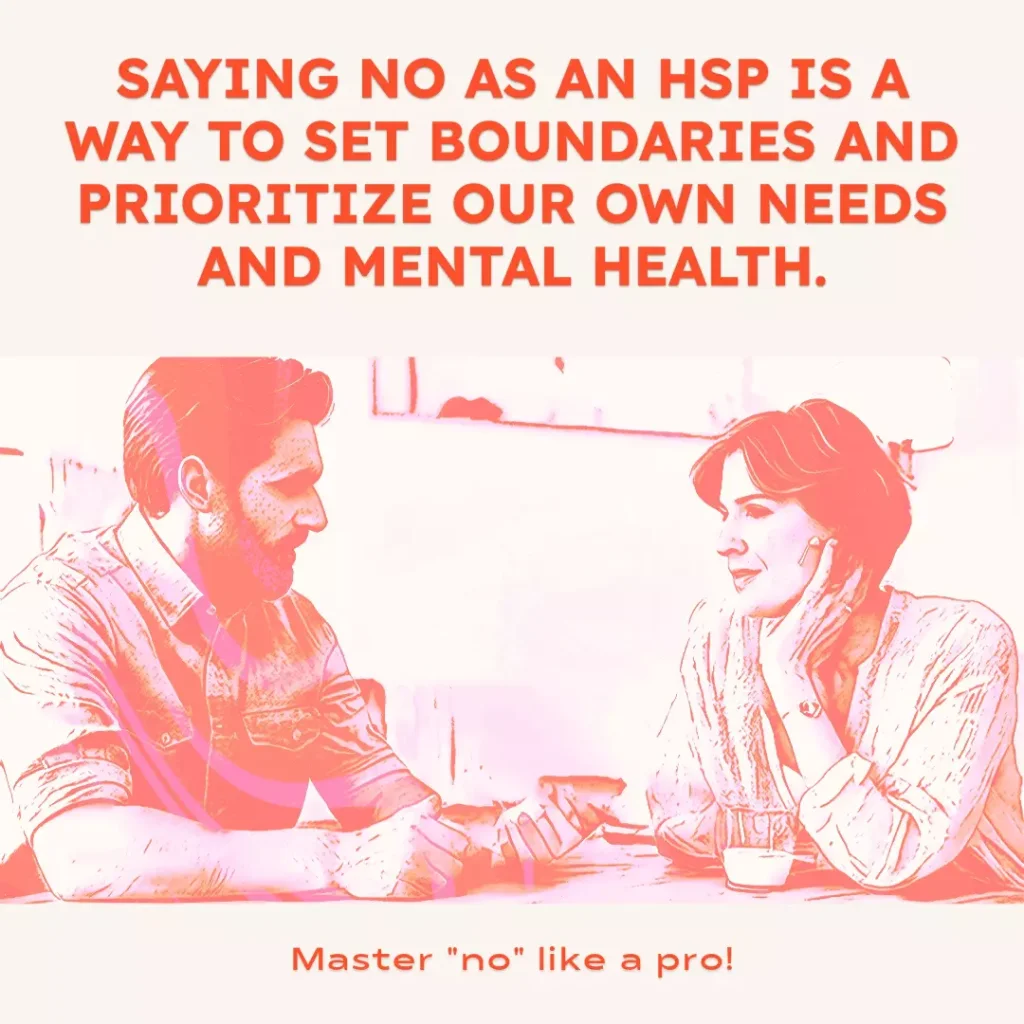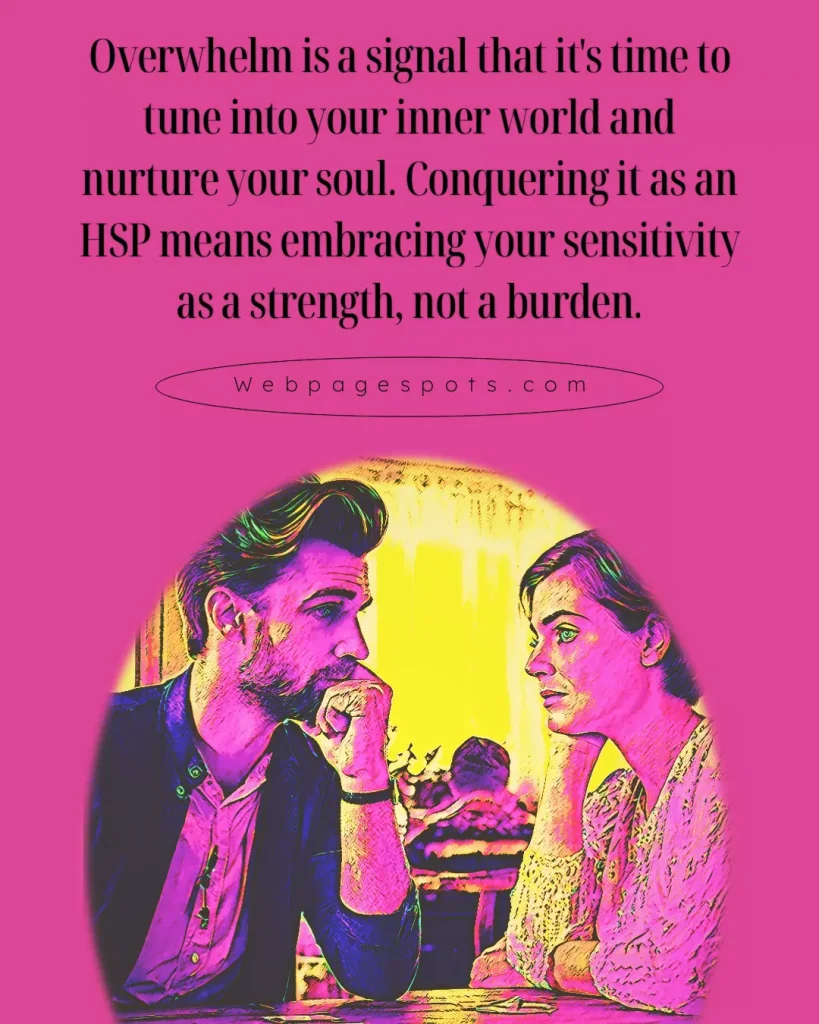9 tips for setting HSP boundaries: Master “no” like a pro!
This blog post may contain affiliate links. If we find a product or service to be useful, we encourage you to visit the website via that link. If you make a purchase through our referral link, we may receive a commission. Rest assured, you will not be charged any additional fees. By using these links, you can support us while making your purchase. For more information visit here.
Imagine a life where your sensitivity isn’t a burden but a superpower. “No” isn’t just a defense but a doorway to deeper connections and vibrant energy.
As a highly sensitive person (HSP), mastering the art of boundaries unlocks this transformation.
No longer bound by people-pleasing, you tap into your inner wisdom, creating a life that resonates with your authentic self.
It’s not about avoiding the world, but about finding harmony between your sensitivity and the obligations of life.
Are you ready to shed the “yes” that drains you and say “yes” to a life that truly shines?
Dive in, explore your boundaries, and discover the powerful HSP within. Your unique light awaits—go forth and illuminate it!
Conquer Overwhelm as an HSP: 9 Tips for Setting Powerful Boundaries!
Imagine feeling every nuance of emotion and every detail of your environment, like a symphony playing constantly around you. That’s the reality for highly sensitive people (HSPs).
Although it brings unique gifts like profound empathy and deep intuition, it can also lead to overwhelm in our fast-paced world.
Don’t be afraid, soft-hearted! By setting powerful boundaries, you can effectively manage your energy and create a nurturing environment that honors your sensitivities.
Here are 9 practical tips to help you conquer overwhelm as an HSP:
1. Become an Inward Explorer
Delve deep and discover your inner needs. What drains your energy like a vampire on a rampage? Is it the loud music at work or the constant notifications buzzing in your pocket?
Identifying your personal triggers is the first step towards setting boundaries that truly protect you.
2. Speak your truth with kindness.
Remember, boundaries don’t have to be walls. Communicate assertively but compassionately with the people in your life. Clearly explain how situations affect you without blaming or making excuses.
Speak your truth with confidence, but sprinkle in some kindness! Honesty helps cultivate understanding from those around you.
3. Master the Art of “No.”
As an empathetic individual who often puts others’ needs first, saying “no” may not come naturally.
But remember, prioritizing yourself doesn’t make you selfish; it allows you the capacity to truly show up for others when needed.
Practice saying “no” with grace and firmness, and watch your overwhelm melt away.
4. Craft your personal oasis.
Designate areas in your living space where tranquility reigns supreme. Is it a cozy reading nook with warm lighting and fluffy blankets? Or a meditation corner filled with calming scents and soothing music?
Create your own peaceful sanctuary, a place of calm amidst the chaos outside the four walls.
5. Tame the Tech Tiger
In today’s digital age, screens can feel like portals to overwhelm even the most resilient souls.
Establish boundaries around screen time—create tech-free zones in your home, set social media limits, and silence notifications during mealtimes or before bed.
Reclaim your precious mental space and watch your overwhelm shrink.
6. Self-Care: Your Superpower!
Engage in self-care practices that replenish your energy and soothe your sensitive soul.
Whether it’s taking long baths with Epsom salts, going for nature walks to soak in the calming green, practicing yoga to quiet your mind, or meditating to find inner peace, find what nurtures you and make these activities non-negotiable parts of your routine.
7. Find Your Tribe
You don’t have to navigate this alone! Surround yourself with understanding individuals who celebrate your sensitivity.
Find like-minded friends, join online communities, or attend HSP meetups. Building a supportive network can be your anchor in the storm of overwhelm.
8. Listen to your body’s whispers.
Your body is a wise teacher; pay attention to its signals! Does anxiety creep in at loud gatherings? Does physical tension build when someone oversteps your boundaries?
Learn to recognize these signs of overwhelm and respond accordingly.
Excuse yourself from triggering situations, practice relaxation techniques, or simply take a moment to breathe deeply and remind yourself you are in control.
9. Guard your emotional space.
Boundaries aren’t just about external influences; they also involve protecting your emotional well-being. Learn to differentiate between others’ emotions and yours.
This empowers you to offer support without internalizing negative energies. Remember, you are not responsible for fixing everyone else’s problems.
Wrapping the section:
Conquering overwhelm as an HSP isn’t about shutting yourself off from the world, but about recognizing your unique needs and learning how to set powerful boundaries that honor your sensitivity.
By implementing these tips into your daily life, you can transform overwhelm into calm, nurture your sensitive soul, and thrive in a world that often feels too bright and too loud.
Remember, you are not alone in this journey, and with self-compassion and these tools, you can create a life that feels balanced, fulfilling, and truly your own.

Why Setting Boundaries is Crucial for Those with High Sensitivity: 9 Key Reasons.
Highly sensitive people (HSPs) possess an innate ability to absorb and process the subtleties of life around them, allowing for deep connections and profound experiences.
While sensitivity can be a gift, it also demands careful consideration in maintaining emotional well-being.
In this passage, we delve into nine compelling factors that highlight the fundamental role of setting boundaries in nurturing the unique traits of highly sensitive individuals.
1. Recharge and refuel.
For HSPs, prioritizing self-care becomes paramount because of their heightened sensitivity to external stimuli.
Establishing boundaries safeguards precious alone time for restorative practices such as meditation or engaging in hobbies that recharge their energy reserves.
2. Preserving Emotional Well-Being
Setting clear limits prevents HSPs from becoming overwhelmed by other people’s emotions or environmental triggers.
By defining what they will and won’t tolerate emotionally, they safeguard their own mental health while still being compassionate towards others.
3. Prioritizing Relationships
Boundaries aren’t barriers—they’re bridges.
Establishing personal boundaries enhances communication within relationships by encouraging open dialogues regarding individual needs and limitations.
This revelation nurtures deeper connections based on mutual understanding and respect between HSPs and their loved ones.
4. Honoring Energy Levels
Highly sensitive individuals experience energy fluctuations because of overstimulation—a phenomenon often misunderstood by non-HSPs, who may perceive these variations as fickleness or inconsistency.
By setting boundaries around social engagements or excessive sensory inputs during periods of low energy, HSPs can preserve their vitality without guilt.
5. Cultivating Personal Growth
Boundaries lay the groundwork for personal development by enabling self-reflection—giving highly sensitive people ample time and space to explore their thoughts, emotions, strengths, aspirations, and areas requiring growth without external distractions or intrusions.
6. Maintaining Authenticity
Boundaries empower you to say “no” to societal pressures and expectations that don’t resonate with your true self.
HSPs embrace their authentic selves without succumbing to societal pressures or conforming to others’ expectations.
Through clearly defined limits and values, they can remain true to themselves while carving out a space replete with genuine connections and experiences.
7. Enhancing Productivity
HSPs often juggle sensitivity and high performance.
Intentionally setting boundaries around work environments, tempo, and workload ensures a sensitive individual maintains healthy levels of productivity, preventing burnout.
By preserving equilibrium in all aspects of life, HSPs can bring their unique skills and talents to the forefront without experiencing career fatigue.
8. Building emotional resilience
Highly sensitive individuals have an exceptional capacity for empathy but are susceptible to emotional exhaustion when constantly absorbing other people’s pain.
Establishing emotional boundaries helps prevent them from becoming overwhelmed by external influences, thus strengthening their flexibility in challenging situations.
9. Encouraging Self-Advocacy
By setting boundaries, highly sensitive people learn the importance of advocating for themselves effectively—a crucial skill that allows them to navigate through life with increased self-assurance both personally and professionally.
Wrapping the section:
For a sensitive individual who possesses remarkable insight into the world around him, establishing clear personal boundaries is vital to preserving mental well-being while embracing authenticity and cultivating deep connections.
For HSPs, setting boundaries isn’t just about self-protection—it’s about unleashing their full potential.
It’s about embracing their own sensitivity while doing good for others. By fostering deeper connections, one creates a life that truly resonates with one’s authentic self.
Why Saying “No” is Your Secret Weapon as an HSP
Unleash Your HSP Superpower: Why Saying “No” Rocks Your World!
Being an HSP is like having superpowers! You feel emotions deeply, connect intensely, and experience the world in rich detail.
But like any superpower, it comes with challenges.
Feeling overwhelmed, drained, and even depleted can be a common struggle. The secret weapon to unlocking your true HSP potential? Saying “no” like a pro!
Why “No” is Your Magic Wand:
- Energy Shield: As an HSP, your energy is precious. Every interaction and stimulus draws from it.
Saying “no” to draining situations or requests protects your energy, letting you be truly present for what matters most. - Confidence Booster: Setting boundaries and politely declining shows you value your time and well-being. This self-respect translates into soaring confidence and a rock-solid sense of self-worth.
- Bye-bye Overwhelm: HSPs are prone to feeling overloaded and anxious. Saying “no” empowers you to create a calmer, more manageable environment, reducing stress and fostering inner peace.
- Self-Care Champion: True self-care means saying “no” to energy-draining things and saying “yes” to activities that nourish your soul.
Meditation, reading, or nature walks? Use “no” to make self-care a priority! - Relationship Rocket Fuel: Healthy relationships thrive on respect and understanding.
Setting boundaries, including the ability to say no, creates clear communication, leading to deeper connections where others value and honor your needs.
Embrace Your True Power
Remember, saying “no” isn’t about being mean or hiding away. It’s about respecting your sensitivity and creating a life that truly fuels you.
By mastering the power of “no,” you unlock your true potential as an HSP. You become a shining example of authenticity, radiating peace and confidence while inspiring others to prioritize their well-being too.
Let your “no” flag fly and watch your amazing HSP superpowers soar!

Unveiling 9 Common Challenges to Saying “No” as an HSP!
As highly sensitive people (HSPs), we possess a unique set of characteristics that make us empathetic, intuitive, and compassionate individuals.
We value harmony and peace, often putting the needs of others before our own.
However, this innate desire to please can lead us down a path of difficulty when it comes to saying “no.”
This section will explore nine common challenges faced by HSPs when confronted with the prospect of declining requests or setting boundaries.
1. Fear of making someone sad
One major challenge in saying “no” to HSPs is the fear of disappointing or hurting others’ feelings.
Riddled with empathy, we naturally foresee their emotional response and dread, causing sadness or disappointment.
2. Feeling guilty like you did something wrong
Linked closely to the previous point is the overwhelming sense of guilt often experienced by HSPs after uttering that two-letter word.
We often internalize these emotions, mistakenly believing that declining a request equates to wrongdoing.
3. Not wanting to seem rude or mean
Driven by our inclination towards kindness and maintaining harmonious relationships, being perceived as rude or mean terrifies many HSPs when faced with denying someone’s request.
4. Worrying people won’t think you like them
One inherent trait peculiar to HSPs is our intense need for validation from others.
Therefore, refusing someone’s demand may trigger anxiety about potential negative judgments about our character or whether they would perceive us differently.
5. Feeling pressured to say “yes” even when you don’t want to
Highly sensitive people (HSPs) bear a weighty burden because of their heightened sensitivity.
This burden puts them at risk of feeling compelled to accept requests against their better judgment, influenced by external pressure from friends, family members, colleagues, or societal expectations.
6. Difficulty saying “no” clearly and confidently
Articulating a firm and assertive “no” can become rather challenging for HSPs, particularly because of our inclination towards meticulousness and avoiding conflict.
This often results in vague responses or hesitations that may not effectively communicate our boundaries.
7. Not knowing how to explain why you’re saying “no”
HSPs value meaningful connections; hence, we often struggle with finding the right words to justify our decision honestly.
This difficulty in expressing the rationale behind declining adds a layer of complexity to saying “no.”
8. Feeling like you have to explain yourself too much
Because of their heightened emotional capacity, HSPs often believe they must provide detailed explanations for every refusal—an attempt at validating their choices—leading them into a never-ending loop of excessive justifications that aren’t always necessary.
9. Worrying that other people will think you’re unreliable
HSPs fear that frequently declining requests or setting clear boundaries will label them as unreliable individuals.
Concerned about jeopardizing relationships, these worries loom large in their minds.
Confronting these challenges head-on is essential for HSPs seeking personal growth and improved overall well-being.
It is crucial to recognize that communicating one’s limits and asserting oneself does not equate to selfishness but promotes healthier dynamics within relationships.
Being a highly sensitive person (HSP) comes with special gifts but also some tricky moments.
Setting boundaries and saying “no” can feel tough, but it’s the key to taking care of yourself and building genuine connections with others!

Master “No” Like a Pro with 9 Powerful Tips and Scripts
Saying ‘no’ can be challenging for many individuals, often leading to feelings of guilt or anxiety. However, mastering the art of saying ‘no’ is essential to maintaining personal boundaries, managing time effectively, and prioritizing your goals.
In this passage, we will explore nine powerful tips that will enable you to confidently say ‘no’ in various situations while fostering healthy relationships and personal growth.
1. Understand your priorities.
Before saying ‘yes’ or ‘no,’ take a moment to assess your priorities.
By understanding what truly matters to you, it becomes easier to take actions aligned with your goals and values.
2. Reflect on your limits.
Recognize your limits—physical, emotional, and mental—as they play a crucial role in determining when it’s appropriate to decline requests politely.
Respect these limits by not overloading yourself with commitments beyond what you can handle without compromising your well-being.
3. Hone your ability to listen with sensitivity.
When someone makes a request of you, listen attentively before responding immediately.
Show empathy towards their needs, but remember that considering their demands doesn’t automatically mean accepting them outright.
4. Know That It’s Okay to Say “No”:
Realize that saying ‘no’ does not make you selfish; instead, it describes self-respect and creates healthier boundaries within relationships.
Acceptance without reservation remains key while staying true to yourself.
5. Offer alternatives (sometimes).
If circumstances prevent you from fully agreeing, but you still want to help in some capacity or suggest an alternative solution without overburdening yourself or sacrificing other commitments,…
Can’t fully commit? Suggest alternatives or connect them with someone who can help.
Example script: “I’m unable to commit fully at the moment because of my current workload; however, I can assist by offering guidance or connecting you with someone who might be available.”
6. Be clear yet polite.
Assertiveness is crucial when saying ‘no’ effectively. Communicate your decision with clarity and confidence while maintaining a polite tone to avoid inadvertently offending the other person.
Example script: “I appreciate you thinking of me for this task, but unfortunately, I’m not able to do it right now. Thank you for considering me.”
7. Avoid over-explaining.
Avoid over-explaining or apologizing excessively for declining a request, as it can weaken your stance and perception of the boundaries you have set.
For example, “While I understand the importance of this project, my current workload prevents me from dedicating sufficient time and attention to it.” A simple “Thank you for understanding.” suffices.
8. Choose your words wisely.
Choose words mindfully when saying ‘no,’ ensuring they empathize with the situation while remaining true to your intentions.
Be mindful, like, “While the project sounds great, I can’t dedicate the time it deserves right now.“
9. Help Within Boundaries
Sometimes, genuine need persists. Offer limited support to show empathy without compromising yourself. “I can’t join the meeting, but I’m happy to share my notes.“
Wrapping the section:
Mastering the art of saying ‘no’ requires practice, self-awareness, and understanding personal values along with one’s limits effectively.
By implementing these nine powerful tips and scripts in different scenarios, you can confidently decline requests without guilt or anxiety while enhancing relationships.
Setting Digital Boundaries for HSPs (Saying No to Social Events Without FOMO)
Setting Digital Boundaries: For HSPs, Saying No Can Mean Feeling More
In our hyper-connected world, HSPs (highly sensitive people), with their heightened awareness and emotions, sometimes feel overwhelmed by the constant online demands.
Social media notifications, group chats, and event invites flood their devices, leaving them struggling to balance social connection with mental well-being.
To avoid the fear of missing out (FOMO) and truly thrive as an HSP, setting digital boundaries is key. Here are some strategies:
1. Prioritize yourself.
HSPs, remember your needs first! Unplug daily for activities that nourish you, like reading, meditation, or nature walks. This self-care prepares you for potential online overload.
2. Create offline pockets.
Schedule breaks during busy weeks. These “me-time” periods away from screens and interactions allow you to process emotions authentically, without external stimuli.
3. Selectively choose virtual commitments.
Avoid feeling pressured to say yes to everything online. Select virtual events and group activities that truly resonate with you, even if it means saying no to others. Quality connections over quantity!
4. Communicate authentically
Explain your unique needs to your loved ones. Educate them on how to approach social interactions differently. Understanding fosters support for your “no”s without them feeling excluded.
5. Connect authentically offline.
Foster meaningful face-to-face relationships. Meet friends regularly or explore hobbies that offer in-person interaction.
These experiences ground you outside the digital world and nourish deeper connections.
6. Curate your social media presence mindfully.
Social media can be a double-edged sword. Avoid comparison traps, and curate your feed with positivity. Follow accounts that uplift you, not those that trigger distress. Quality over quantity again!
7. Create tech-free zones.
Designate areas in your home as technology-free havens. Disconnect and enjoy tranquility away from constant connectivity.
These spaces allow for deeper self-connection and reinforce boundaries between the external digital world and your internal well-being.
Prioritizing self-care, engaging offline, managing online time, and communicating needs helps HSPs thrive in both the digital and physical worlds.
Embracing real-world experiences and creating havens of peace allows HSPs to connect authentically without falling prey to FOMO.
Remember, saying no isn’t about rejecting others; it’s about choosing yourself and building a life that truly works for you.
Reap the Rewards: 9 Benefits of Mastering “No” for Highly Sensitive People (HSPs)
For highly sensitive people, saying “no” can be a daunting task.
Fearing rejection or feeling overwhelmed by the demands of others, HSPs often find themselves burdened with unnecessary responsibilities and compromised well-being.
However, mastering the ability to say “no” can bring about incredible benefits that enhance their overall quality of life.
This passage will delve into nine rewards that await those who embrace assertiveness and learn to prioritize their own needs.
1. Deeper Connections
Saying “no” allows HSPs to prioritize connections that truly resonate with them. By not spreading themselves thin, they can invest more time and energy into fostering deeper, more meaningful relationships.
2. Reduced People-Pleasing
Mastering “no” helps HSPs break free from unhealthy, people-pleasing tendencies.
This can liberate them from feeling responsible for others’ happiness and empower them to focus on their own fulfillment.
3. Enhanced Intuition
Saying “no” allows HSPs to listen more closely to their intuition, helping them avoid situations that feel draining or inauthentic.
This can lead to more aligned choices and experiences that resonate with their sensitivities.
4. Stronger Boundaries with the World
Mastering “no” empowers HSPs to create safe spaces for themselves. They can learn to filter out external stimuli or negativity that overwhelms them, fostering inner peace and emotional stability.
5. Boosted Energy Levels
Saying “no” allows HSPs to protect their precious energy reserves.
By avoiding draining commitments, they can channel their energy towards activities that truly nourish them, leading to increased vitality and a richer experience of life.
6. Reduced decision fatigue
Mastering “no” simplifies decision-making for HSPs. By learning to confidently decline, they eliminate unnecessary options and can focus their energy on choosing what truly matters to them.
7. Increased Sense of Agency
Saying “no” empowers HSPs to take control of their lives.
They realize they have the power to shape their experiences and can actively choose what they engage with, fostering a stronger sense of autonomy and self-confidence.
8. Improved Time Management
Mastering “no” allows HSPs to manage their time more effectively.
By prioritizing commitments that align with their values and sensitivities, they can create a schedule that promotes both productivity and self-care.
9. Inspiring Others to Set Boundaries
HSPs who embrace “no” can serve as models for others, especially those who struggle with assertiveness or setting boundaries.
This ripple effect can create a more compassionate and understanding world where everyone feels empowered to prioritize their well-being.
Wrapping the section:
Learning how to say “no” is crucial for highly sensitive people seeking personal fulfillment in a world often overrun by constant demands from others.
Saying “no” empowers HSPs to take control of their lives, reducing stress and overwhelm.
This leads to better self-care, stronger relationships, higher productivity, and personal growth, allowing them to live authentically and thrive despite daily challenges.
Conclusion
Embrace your identity as an HSP without withdrawing from the world. Instead, envision it as a harmonious duet between your sensitivity and life demands.
See your “no” not as a barrier but as a bridge leading to deeper connections and avoiding isolation.
Channel it to nurture genuine relationships, prioritize self-care, and express your distinctive essence.
Mastering the skill of setting boundaries sparks a profound transformation.
Cast off the shackles of people-pleasing, tap into your intuitive wisdom, and cultivate an invigorating wellspring within.
Confidently declining what depletes you allows you to wholeheartedly embrace a life that aligns with your HSP soul.
Remember, your sensitivity is your superpower, and setting boundaries empowers you to wield it with grace and purpose.
Embark on an introspective journey, uncover your boundaries, and construct a life that honors your authentic, sensitive self.
The world eagerly awaits your unique light, radiating brightly within the framework of healthy, self-defined boundaries. Forge ahead and illuminate it!
Understanding the importance of copyright law is absolutely vital, as it strictly prohibits any reproduction or replication of works without the explicit permission of the author. Any unauthorized duplication of content will lead to legal action for copyright infringement under Section 14 of the Copyright Act.











